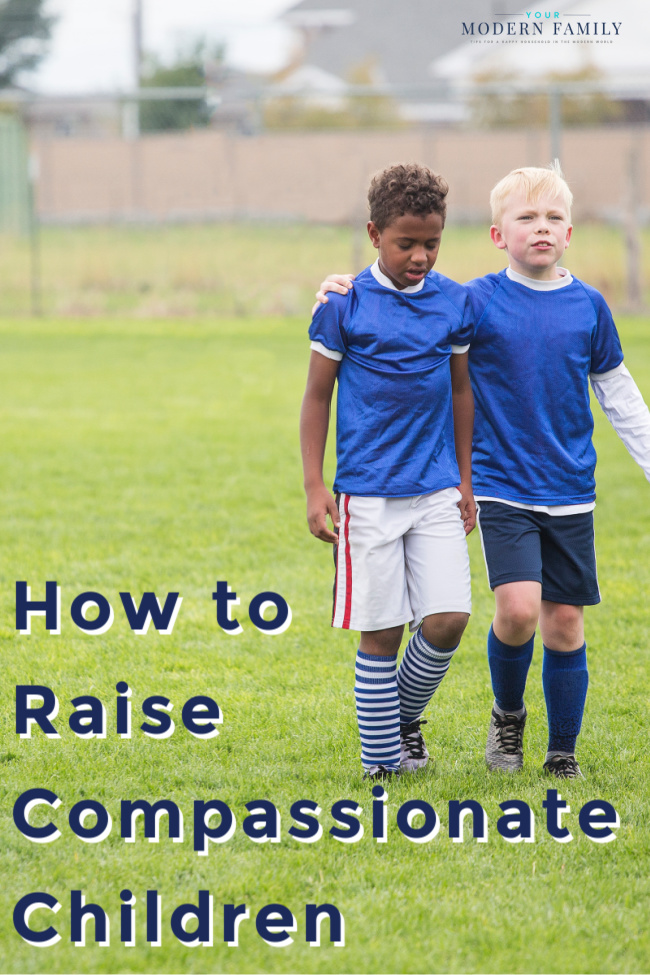This post may contain affiliate links. Please read our disclosure policy.
As parents, we often hope to see many character traits in our kids. I work hard to teach our children to be grateful and compassionate, and I hope always to see compassion grow in my children’s hearts. In a world where people often plow past others, never looking at those around them, I want my kids to see others. I want to raise kind, compassionate, empathetic children.
Update: This post was originally written and shared several years ago, but it still holds true today.
Four Ways to Teach Kids to be Compassionate
Teaching children to have eyes that are open to others can be a challenge. To help them understand how others are feeling and have empathy for others isn’t always easy. However, as daunting of a task as this is, teaching our kids to have compassion is really easier than we think.
Often, it is in the little steps every day that can build this compassionate heart.
Here are four ways to get started…
1. Make it a regular conversation
Just as with any other character trait you are working on as a family, start with a conversation. To teach kids to be compassionate, we need to help them every day.
Children will develop empathy and develop compassion when they see it more often. Ask your child if they know what compassion means. Then, start talking about what it means to show compassion. Share examples and point out situations when reading books, watching shows, or while talking that show empathy and compassion.
As they go about their everyday life, encourage them to see others… to really see others. Always continue the conversation; remember it takes time to build this- baby steps.
Use these little moments with your children as teaching moments. Soon, it won’t be a conversation that naturally flows. Kindness and compassion come from the things that we do on a daily basis.
2. Keep an eye on what they are taking in
Kids are like sponges and are absorbing new information every day. All sorts of media constantly pour into our kids through television, tablets, and phones. Without even realizing it, our kids could be observing poor models of compassion.
I was just talking to Mickey about this the other day… talking about how I wanted our kids to start listening to uplifting podcasts, encouraging songs, and more. I just think it is so important that we put these things in front of them because the world is giving them a lot of other options, so it’s up to us to weed through it and provide them with the things that will help them to become the people that they were meant to become.
Think about what your kids are consuming on a regular basis. What is the show teaching your child? We cannot control everything our kids see, but we can keep boundaries up at home. Personally, I have our kids’ electronic devices restricted… a lot. That’s not to say that they can’t watch things, but it is to say that I am keeping an eye on everything.
I even have the Bark app on all of our kids’ devices. I can’t imagine not having this. I’d get it just for the text message monitoring. To say it’s been eye-opening is an understatement!
3. Lead by example
We say this all the time because it is a basic truth. Your kids are watching you all the time. They see how you interact with your best friend and then with the stranger at Walmart. Even when you do not think they are listening, they are.
Whatever they hear… that’s what they will repeat. Look at your own life; are you showing compassion to others? Do they hear gossip, or do they hear compassion and empathy? Do they see kindness in your facial expressions when you are talking about others? Do they see you working hard to be kind?
4. Put it into action
A lot of times, we talk about all the things but do not always put it into action. One practical way to put compassion into action is by involving your kids in service projects, perhaps by donating to a local food bank or working on an act of kindness every day. When you find great deals on items that can be stored, donate them so others can use them.
How could your family step into action? How can they volunteer to help others? How can they be selfless and put others’ needs before their own? When you start small when they are young children, they will start to think big as they get older!
Teaching your kids about compassion is not something that is done on a weekend or even in a year. It takes time and daily steps to build compassion. However, as your kids learn, you will start to see glimmers of hope as your child exhibits compassionate reactions toward others. Teaching compassion helps them become compassionate. What a difference you can make in one person!
Do you have any tips to help teach kids about compassion? I’d love to hear them!
















